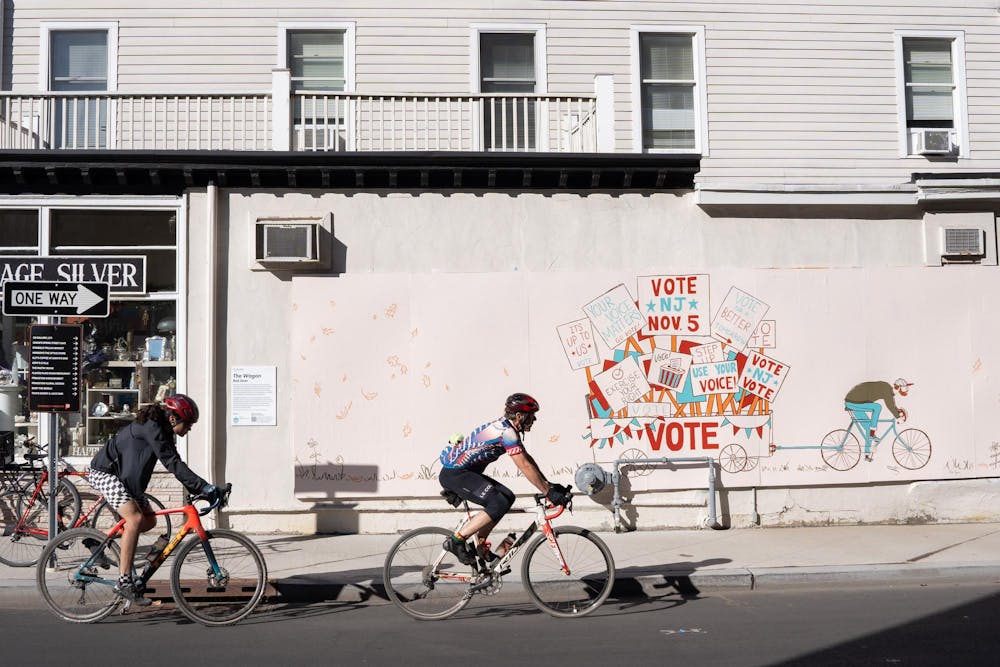Following the general election on Nov. 5, students have expressed logistical reasons for not voting, including barriers in their own state and within the University. The 2024 election marks four years since student voting participation peaked during the 2020 election.
In 2020, the Office of the Dean of Undergraduate Students published a study done by the National Study of Learning, Voting, and Engagement. The study revealed that voting participation among students at Princeton increased tremendously from 2014 to 2020.
2014 was a midterm election, and only about 10.5 percent of students voted. This number increased seven-fold, when 75.4 percent of eligible student voters cast their ballots in 2020. This turnout was “up 24.9 points from the 2016 election.”
That leaves 24.6 percent of eligible students who did not vote in 2020.
Current Vote100 fellow Aishwarya Swamidurai ’26 told The Daily Princetonian in an interview, “There are a lot of hurdles that students face that make it especially difficult [to vote] in a college setting.”
In a written statement to the ‘Prince’ after the election, Yuka Childers ’26 discussed her unsuccessful attempt to vote.
After registering in North Carolina, Childers was gearing up to vote for the first time.
She requested to vote by mail and her ballot was intended to be mailed to her home in North Carolina. Childers indicated that she became concerned “when over a week had passed, and I did not receive the ballot.”

Following a “not very helpful” and “rude” interaction with the voter registration office, it was confirmed that her mail-in ballot had been sent and arrived at her address. However, “my mother checked multiple times and did not find it,” wrote Childers.
Childers explained that she had missed both the deadline to register to vote in New Jersey and to request another mail-in ballot, and thus, was unable to vote. She expressed regret in waiting for her ballot to arrive instead of exploring other routes to vote.
“I am very disappointed that I did not get to vote,” wrote Childers.
Swamidurai explained that personal schedules as well as certain state laws pose barriers to college students voting. “There are some states that may only have absentee ballot and voter registration occurring via paper applications, whereas other states have online portals.”

Mail-in and absentee ballots as forms of voting have become increasingly popular among college students. Students have reported issues with receiving ballots, a phenomenon not unique to Princeton.
Jack Lichtenberger ’25 is registered to vote in Massachusetts and told the ‘Prince’ about his experience with mail-in ballots after he wasn’t notified his ballot was delivered and missed the deadline to send it back for his local election.
Lichtenberger told the ‘Prince’ in an interview that he had mailed a request form for mail-in ballots for the upcoming state and general election back in June.
“They [Frist Campus Center] didn’t notify me that I got the [state election] ballot,” said Lichtenberger, who picked his ballot up the day it was due back to the precinct after going to Frist to ask if his ballot had arrived.
Effective Feb. 1, 2024, all undergraduate and graduate students with mailing addresses at Frist will receive an email notification upon arrival of First-Class mail, after going months without notifications due to processing software changes and new Frist mailbox numbers implemented in July 2023.
“It’s really weird that maybe the single most important piece of mail that I’ve received, and they had it in my mailbox — it was processed and sorted,” said Lichtenberger.
As many politicians from his area had been running uncontested, Lichtenberger explained not voting was not the end of the world for him, but he expressed concern about this scenario representing a “really weird break in a consistent pattern.”
Ahmad Rizvi, the University’s media relations specialist, wrote in an email to the ‘Prince,’ “First Class mail is usually prioritized, but during election seasons any mail marked as Election Mail or that appears to be Election Mail is given first priority.”
“All Election Mail was processed the same day we retrieved it from the Post Office,” Rizvi added, also explaining that the mailing delays for Election Mail were experienced nationwide this year.
Rowan Johnson ’27 told the ‘Prince’ in an interview post-election that he faced issues with meeting deadlines for voting and ultimately was unable to do so.
“It was largely a matter of inconvenience,” said Johnson, who is registered to vote in Monmouth County, N.J.
Johnson explained that his issues began when he “neglected to send in” his mail-in ballot application until a few days before it was due for this month’s general election.
He called the local clerk’s office and was informed that his application had not been processed and that his two options were to vote in person on Election Day or vote early.
He was unable to travel to the nearest polling site in Monmouth County due to a busy schedule and the expense of travel.
Johnson emphasized his belief that as a student from a non-swing state like New Jersey, his vote would not have directly impacted the outcome of the election. “I know for a fact my vote was of no consequence in actually determining the results of the election,” he said.
He elaborated on this viewpoint, explaining that his circumstances represent larger “structural issues with voting.” Johnson described that many people abstain from voting because it is an inconvenience or because they do not feel represented in this system of democracy.
“I feel our ‘democracy’ is not actually very representative of either the interests of the people or the voice of the people,” said Johnson.
Cynthia Torres is a News contributor for the ‘Prince.’ She is from New Bedford, Mass.
Associate News Editor Olivia Sanchez contributed reporting.
Please send any corrections to corrections[at]dailyprincetonian.com.








